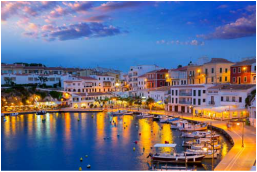 The first time I tried to write about Spanish culture, I hadn’t really fully experienced Spain. I tried to give my followers what I thought they wanted. After two whole weeks in Spain, I thought that I could give an accurate description of the traditions and customs with which many, if not all, Spaniards identify. But, now that I had been in Spain for three months, I have realized that my report was made prematurely. I hadn’t stewed in the Spanish fragrance for long enough to soak in any understanding of their Mediterranean life. Now, after coming home to the US after being in Spain for three months, I recognize that I still probably am not qualified to evaluate their whole culture, and what defines these people. But, I hope that I can share some of the cultural norms and attitudes that these people have in common. The first thing that really stood out to me is that the Spanish people are really practical. When they work, they really work. And when they take time off of work, they don’t think or worry about work. Half-way through the summer, my leg had been bothering me. I thought that maybe I had torn something, and wanted to see a doctor just in case. After I called the office, asking for an appointment, I was scheduled in with a muscle specialist for just the next week. After my preliminary appointment, the doctor scheduled me to get an MRI the following week. Each visit was quick–at the preliminary appointment, the doctor asked me questions, checked my leg, and right away set-up my appointment, and at the MRI appointment, the doctor doing the procedure gave me an answer immediately after (nothing was seriously damaged). At both visits, the doctors were eager to help and there was hardly no wasted time. I have no doubt that these doctors also took time off from work. In Spain, there are countless little cafes in the towns. During the summer, tables are set up outside so that people can enjoy their drink and a little snack outside. After breakfast, and before lunch, these cafes are filled with customers. And at night after dinner again. Spanish value friendship in such a way that they will meet with different friends at these cafes many times a week, if not every day. Along with being practical, and setting aside time for friends during the day, the Spanish are overall outwardly friendly. When you walk into a small store or building, if you don’t say good morning or afternoon, people usually think you are not from the country. When I went to city councils with my host mom, whenever we would walk through the door she would say, “Buenas” (short for good day), and everybody, or almost everybody would respond. Not only is this a nice action, but it shows that you have entered, and it lets the people working now that you have arrived. In this way, it works as a conversation starter, a way to show everyone else you’re friendly, and a way to announce your presence and position in line. In Spain, and I think in the rest of Europe, gasoline is highly expensive. Many households just own one or two cars, and try not to drive if they can help it. At one point, the gas here cost twice as much as it did in California. Therefore, many people take the bus. It is quite simple to use the buses, and this form of public transportation is rather common. Because of the culture of openness, the buses are hardly ever quiet. When people walk in, they say hello. And if you live in a small town, many of the people on the buses will have the same schedule, so after a couple of trips, people will make friends and talk. I have really enjoyed my time in Spain. I have fallen in love with the culture and the people. I realized that most of the time when I thought somebody was giving me a dirty look, they had only been curious because I looked different. But after I said hello and talked to them, asking for directions or commenting on the day, they lit up with a smile and shared a story or two with me. If I asked for directions to something they didn’t know, they would shrug their shoulders and then tell me where else to go and wish me luck. I think that sometimes, the outsiders that people had come in contact with destroyed their image of the outsider in general. Sometimes American travelers aren’t the nicest or most thoughtful. These especially obnoxious travelers may have made fun of the Spanish culture, or may have purchased things from the illegal clothing stands on the beach, supporting the Spanish gangs. So only being exposed to this version of a traveler has tarnished their view of other peoples and cultures. But once you break through that preconceived notion, Spanish are generally welcoming and accepting. Because of this, I have made many friends in Spain. From the gym, other Au Pairs, the Church, and friends of friends, these people have greatly shaped my experience in their country, and have helped brand Spain on part of my heart.
0 Comments
Leave a Reply. |
Jessica De GreeJessica teaches 5th grade English and History as well as 11th grade Spanish III at a Great Hearts Academy in Glendale, AZ. In addition to teaching, she coaches JV girls basketball and is a writing tutor for The Classical Historian Online Academy. Jessica recently played basketball professionally in Tarragona, Spain, where she taught English ESL and tutored Classical Historian writing students. In 2018, she received her Bachelor's degree in English and Spanish from Hillsdale College, MI. Archives
April 2020
Categories
All
|
|
SUPPORT
|
RESOURCES
|
|



 RSS Feed
RSS Feed



